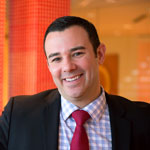As dean and professor at the School of Nursing and Health Studies at the University of Miami, Dr. Nilda “Nena” Peragallo Montano’s groundbreaking work with health disparities and minority populations includes her establishment of the University of Miami’s Center of Excellence for Health Disparities Research: El Centro in 2007. El Centro, the only school of nursing recipient of a National Institute of Health P60 center grant, is now in its sixth year, with research funding from the National Institute on Minority Health and Health Disparities awarded through 2017. Dean Peragallo Montano has devoted herself to this work for more than 30 years and she has been incredibly successful, though that’s putting it mildly. Peragallo Montano has been a member of the National Advisory Council to the National Center on Minority Health and Health Disparities and a member of the Take Care National Advisory Board. She is also the past president of the National Association of Hispanic Nurses and the founding and current coeditor-in-chief of Hispanic Health Care International.
CLASS SCHEDULE
A day in the life of Dean Nilda Peragallo Montano
8:30 – 10 a.m.
Welcome the Scientific Advisory Board of the Center of Excellence for Health Disparities Research: El Centro for the annual two-day meeting
10 a.m. – 12 p.m.
Leadership meeting featuring the dean’s top educational and administrative advisors at the School
12 – 12:30 p.m.
Interview for faculty position
12:30 – 1:30 p.m.
Lunch with School’s Momentum2 Campaign cochairs and School’s executive director of advancement regarding fund-raising strategy for Simulation Hospital
1:30 – 2 p.m.
Greet nursing educators delegation from Universidade de São Paulo, at Ribeirão Preto, Brazil, who have traveled to Miami to tour the School’s International Academy for Clinical Simulation and Research
2 – 3 p.m.
Mentor doctoral student on dissertation (topic: HIV prevention intervention in minority women)
3 – 4 p.m.
Meet with grant writing team, which is submitting a proposal to the National Institutes of Health for funding undergraduate and graduate nursing and health science students to receive mentoring in global health-disparities research
4 – 5 p.m.
Conference call with executive dean, Australian Catholic University Faculty of Health Sciences, to invite the ACU to serve as foreign mentorship site for the School’s international health disparities research grant application
6:30 – 8:30 p.m.
Dinner with the School’s alumni association to discuss plans for upcoming year and thank alumni for serving as ambassadors for the School of Nursing and Health Studies
Devoted Opportunist
Her success, Peragallo Montano says, has come as the result of taking every opportunity that came her way when her family emigrated to the United States from Chile, where Peragallo Montano was born.
“I had already obtained my bachelor’s degree in Chile and when my family decided to come to the US, I took advantage of it; every time I moved I obtained a degree,” Peragallo Montano laughs. “In West Virginia I got my master’s, and when I moved to Texas, I got my doctorate. For me, it was important to take advantage of every opportunity in my path.”
As a public-health professional in the United States, it was impossible for Peragallo Montano not to be aware of the disparities experienced by Latinos and other immigrant populations, especially as they pertained to education and access to health care and information. In the nation’s many immigrant communities, there is a tremendous lack of access to health care and treatment options and, according to Peragallo Montano, language barriers only compound the problem.
As a result, the Center of Excellence for Health Disparities Research culturally tailors its programs to community populations, with special emphasis on HIV prevention, STIs, family and partner violence prevention, substance abuse, and mental health. El Centro also collaborates with institutions in Latin American and Caribbean regions to address health disparities in these countries.
Peragallo Montano is also well-respected in her field for developing a pioneering HIV prevention program aimed at Latinas during a time when studies solely focusing on Latinas were unheard of. What initially began as a study of 700 Chicago-area women from different countries resulted in a program that addresses treatment and co-occurring issues, such as violence.
“When you ask the community what they need, you learn a lot. You have to ask how you can help or what’s needed to truly have an impact and when we spoke to the women, and asked them what they wanted help with, violence was at the top of the list,” Peragallo Montano says. “There is a lot of gang violence in Chicago and it affects the lives of these women and their children. We also address it in the home: how can you initiate condom use if you’re in a violent relationship? So many of the women we work with didn’t know they were in violent relationships; they thought it was the norm. So yes, it’s HIV prevention, but it’s also a bigger discussion about what violence is and how it affects families. We never tell women what to do; just what they can do.”
For Peragallo Montano, the last point is critical. The goal is to always minimize the amount of risk each woman is being placed in, so Peragallo Montano and her team provide resources, escape plans, and tips on how to avoid escalating an argument. “We give them the resources, but the decision is theirs,” the dean says. “The women have truly become a means of support for each other.”
Welcomed Balancing Act
For Peragallo Montano, there are two sides to her work: her research and her teaching. At the University of Miami, she is able to teach the next generation of nurses about her research. Academia was something that interested Peragallo Montano very early on. The dean had her master’s for just one semester before deciding to pursue her doctorate in public health. Being able to engage students and get them excited about her field of study is still incredibly meaningful to Peragallo Montano, who continues to hold various leadership positions, including her recent appointment to the national advisory committee for the Robert Wood Johnson Foundation Nurse Faculty Scholars program. Though leadership appears to come naturally to her, Peragallo Montano asserts there are no natural-born leaders.
“I don’t think anyone is born knowing how to do it; you can be born with leadership qualities, but leading is something you learn to get good at. As you take on different positions, you learn along the way,” Peragallo Montano says. “You have to have a vision; you have to be able to communicate; you have to be able to convince others of your vision and make decisions that aren’t always easy. You have to be open to new ideas. It helps if you’re doing what you love and working on something about which you are passionate. It’s taken me years to learn how to lead.”
Take Note
Words of advice from Dr. Nilda Peragallo Montano
“If you work hard, and have objectives and goals, you can get wherever you want to go. The only barrier is yourself. When an opportunity comes your way, you can’t be afraid to take it.”
Of all her roles—dean, professor, researcher, board member, mentor—the role that Peragallo Montano still finds the most personally meaningful is the one she had from the very start: a nurse. The ability to care for someone and to help those in her community continues to be as gratifying as it was when she was a young nursing student in Chile.
“When you choose to be a nurse, it’s your compulsion to give back. When you do this work you are being of service to others and it’s very much a give and take because you get so much out of this work,” Peragallo Montano says. “Community work is the most rewarding work you can do. What we do has a great impact on the well-being of our communities. It’s a very unique relationship, one that you can’t have in any other field.”

